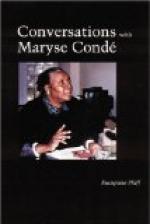|
This section contains 1,251 words (approx. 5 pages at 300 words per page) |

|
SOURCE: A review of Segu, in Black American Literature Forum, Vol. 23, No. 1, Spring, 1989, pp. 183-85.
In the following review, Browne offers a mixed assessment of Segu.
Segu is an epic historical African novel spanning the years from 1737 to 1860; the continents of Africa, South America, and Europe; and three generations of an aristocratic Bambara family, the Traores. Segu, the ancestral home of the Traores, is a town between Bamiko and Timbuktu in present-day Mali. The action centers on the four sons of the nobleman Dousika Traore and their sons. "Four sons—Tiekoro, Siga, Naba and Malobali, the last-born—had to be regarded as hostages or scapegoats, to be wantonly ill used by fate so that the family as a whole might not perish."
The novel presents a polygynous, patriarchal world, with most of its female characters playing a passive, reactive role. The Bambara woman's life revolves around her son...
|
This section contains 1,251 words (approx. 5 pages at 300 words per page) |

|


